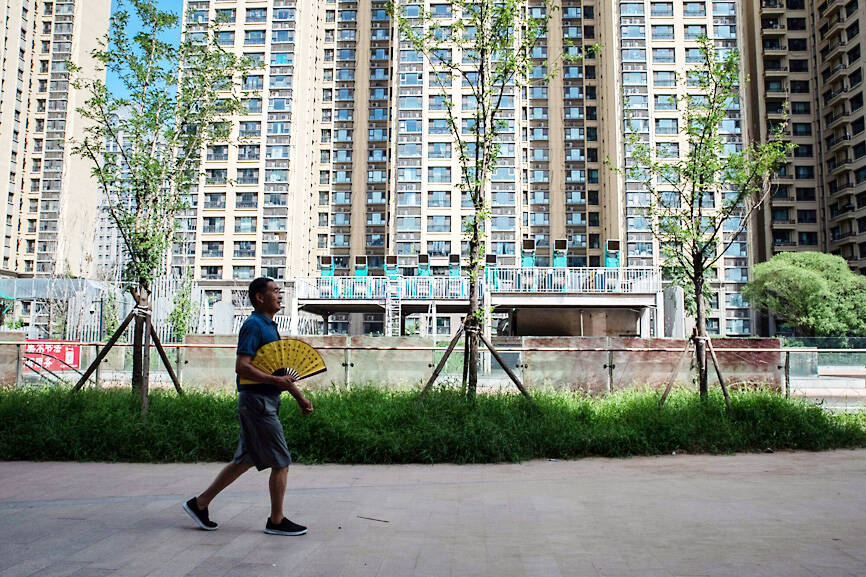Chinese property giant Evergrande Group (恆大集團) on Thursday filed for bankruptcy protection in the US, court documents showed, a measure that protects its US assets while it attempts to restructure.
Evergrande, once China’s top property developer, was found in 2021 to be struggling with more than US$300 billion of liabilities as it came under intense pressure after officials tightened scrutiny of the real-estate industry.
The company’s woes have come to symbolize the growing crisis in China’s sprawling property sector, which accounts for a very large portion of the world’s second-biggest economy.

Photo: Bloomberg
Several major developers have been hit in the unfolding drama as they fail to complete housing projects, triggering protests and mortgage boycotts from homebuyers.
In the latest filings in New York, Tianji Holding (天基控股) and Scenery Journey (景程) — of which Evergrande is the ultimate holding company — filed for Chapter 15 protection, which provides mechanisms for dealing with insolvency cases involving more than one nation.
Evergrande has worked on an offshore debt restructuring agreement for months and unveiled a proposal earlier this year.
The plan offers creditors a choice to swap their debt into new notes issued by the company and equities in two subsidiaries, Evergrande Property Services Group (恆大物業集團) and Evergrande New Energy Vehicle Group (恆大新能源汽車集團).
Evergrande first defaulted on its bonds in 2021, fanning fears of contagion.
The latest court documents referenced restructuring proceedings in Hong Kong.
Yan Yuejin (嚴躍進), research director at the E-house China R&D Institute, told reporters that Evergrande’s latest filing was an “equivalent to seeking a better debt restructuring.”
“In fact, Evergrande’s business is certainly still operational. After all, it has a huge responsibility of ensuring deliveries of presold homes,” Yan said.
Evergrande last month reported a net loss of more than US$113 billion in 2021 and last year.
The group’s liabilities stood at almost US$340 billion at the end of last year, with US$85 billion of borrowings.
The developer had about US$2 billion in total cash at the time.
Housing reform in China during the late 1990s unleashed a boom in the real-estate sector, spurred by social norms that consider owning property a prerequisite for marriage.
However, the massive debt accrued by the industry’s biggest players has been perceived by Beijing in the past few years as an unacceptable risk for China’s financial system and overall economic health.
To reduce the sector’s indebtedness, authorities have gradually tightened conditions for developers’ access to credit since 2020, drying up sources of financing for firms already in debt.
A wave of defaults followed — notably that of Evergrande — which undermined the confidence of potential buyers and reverberated through the industry.
Fellow Chinese property giant Country Garden Holdings Co (碧桂園) risks defaulting on its bond payments next month, after the company said there were “major uncertainties in the redemption of corporate bonds.”
Beijing has sought to bolster the sector by cutting mortgage rates, slashing red tape and offering more loans to developers.

To many, Tatu City on the outskirts of Nairobi looks like a success. The first city entirely built by a private company to be operational in east Africa, with about 25,000 people living and working there, it accounts for about two-thirds of all foreign investment in Kenya. Its low-tax status has attracted more than 100 businesses including Heineken, coffee brand Dormans, and the biggest call-center and cold-chain transport firms in the region. However, to some local politicians, Tatu City has looked more like a target for extortion. A parade of governors have demanded land worth millions of dollars in exchange

Hong Kong authorities ramped up sales of the local dollar as the greenback’s slide threatened the foreign-exchange peg. The Hong Kong Monetary Authority (HKMA) sold a record HK$60.5 billion (US$7.8 billion) of the city’s currency, according to an alert sent on its Bloomberg page yesterday in Asia, after it tested the upper end of its trading band. That added to the HK$56.1 billion of sales versus the greenback since Friday. The rapid intervention signals efforts from the city’s authorities to limit the local currency’s moves within its HK$7.75 to HK$7.85 per US dollar trading band. Heavy sales of the local dollar by

Taiwan Semiconductor Manufacturing Co’s (TSMC, 台積電) revenue jumped 48 percent last month, underscoring how electronics firms scrambled to acquire essential components before global tariffs took effect. The main chipmaker for Apple Inc and Nvidia Corp reported monthly sales of NT$349.6 billion (US$11.6 billion). That compares with the average analysts’ estimate for a 38 percent rise in second-quarter revenue. US President Donald Trump’s trade war is prompting economists to retool GDP forecasts worldwide, casting doubt over the outlook for everything from iPhone demand to computing and datacenter construction. However, TSMC — a barometer for global tech spending given its central role in the

The Financial Supervisory Commission (FSC) yesterday met with some of the nation’s largest insurance companies as a skyrocketing New Taiwan dollar piles pressure on their hundreds of billions of dollars in US bond investments. The commission has asked some life insurance firms, among the biggest Asian holders of US debt, to discuss how the rapidly strengthening NT dollar has impacted their operations, people familiar with the matter said. The meeting took place as the NT dollar jumped as much as 5 percent yesterday, its biggest intraday gain in more than three decades. The local currency surged as exporters rushed to